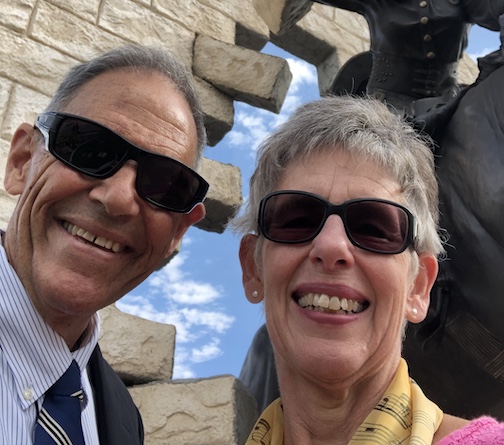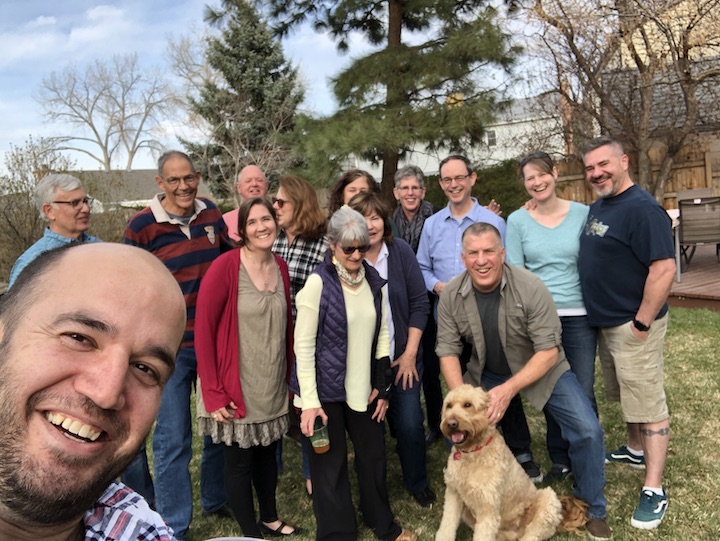 This week Debbie and I were having a delightful conversation with a young couple. They are smart, articulate, hardworking, conscientious, kind, and over all delightful to be with. As we talked about faith issues, I sensed their question, “What difference would it make? We are good people, enjoying a moral life with our friends, there is no agreement among Christians about how to practice the faith, and you can’t prove it is true, so why should we get more involved with Christianity or spiritual things?”
This week Debbie and I were having a delightful conversation with a young couple. They are smart, articulate, hardworking, conscientious, kind, and over all delightful to be with. As we talked about faith issues, I sensed their question, “What difference would it make? We are good people, enjoying a moral life with our friends, there is no agreement among Christians about how to practice the faith, and you can’t prove it is true, so why should we get more involved with Christianity or spiritual things?”
As we talked, I gave them what I thought were reasonable answers, but I don’t think they found my insight helpful. Since that night I have been thinking more deeply and specifically, “why should anyone, who is already kind and conscientious, get involved with Christian spirituality?” As I have thought about why I am so grateful for my Christian faith, and why I will remain committed to Christ, my answers fall into three categories: 1) Practical, 2) Psychological, and 3) Theological. These three categories overlap and the lines between them are not always clear. So, while I like my reasoning, I am “soft” on the categories.
Four PRACTICAL Reasons
Community 
The scriptures command us to meet together (Hebrews 10:24-25). Most often this means church, Bible studies, or some other form of regular meetings fellow believers to worship God, study the Bible, and share our lives in community. (In this blog I will use the word “church” to signify any regular meeting of spiritually-minded people). This isn’t easy; both church-and-people, can be annoying and hurtful in a variety of ways. Anyone who has ever been involved in church knows exactly what I mean. However, being involved with others in this way gives me a place to share the deeper parts of my life. It creates the opportunity to be known and talk about my questions and struggles. If I didn’t have a Bible study or church, I don’t know where I would find that kind of group.
Gratitude
Besides a community of people, it becomes a place to express my thanks to God for the good things in my life (worship). I think it is a universal desire, even if people don’t believe in God, to give thanks to something bigger than we are. I think everyone, at different times, has a desire to acknowledge the transcendent. Going to church regularly gives me words, songs, and a ritual in my life to say “thank you.” Besides the weekly ritual, when I see a beautiful sunset, hear a moving piece of music, or experience any other form of beauty which transcends my normal experience, I have words and songs which I learned at church to express my gratitude.
Morality
Church also provides me a framework to think about the good, the true, the beautiful and the eternal. I had a great philosophy class at Phoenix College which provided that framework, but it only lasted a semester and I need so much more

time to go deeper. Some people think it is easy to know right from wrong, they face few moral dilemmas, and have little need to think about the eternal. Although some things are obviously right and wrong, I am constantly evaluating my speech and my actions and am often confronted with doubts about how to behave. And I often think about the deeper meaning of life, what really matters, and other topics related to the eternal. I need help from others to wrestle with these questions. Church has given me that help. Church was also a place where our kids could learn values and respect for others. It was nice that there were voices guiding our children besides our own.
Church is also a place where I can go when I need help. Different people face different circumstances and need different kinds of help at different times, but I don’t think anyone can go through life without the support of others. It is such an advantage that when you need help, you are already part of a group of people who know you and have already pledged to help one another.
Two PSYCHOLOGICAL Reasons
An Antidote to Worry
It is obvious to the most casual observer that the world is a dangerous place. There are millions of things that could harm or kill you, or the ones you love, every day! And even if you manage to avoid getting hurt or killed, there is always the possibility of economic loss or relational betrayal. It is good to be careful and avoid unnecessary risks, but a life that is free from risks does not exist. This obvious fact could be the cause of serious anxiety. The Bible clearly teaches that God is in control of the universe and the smallest details of your life (Matthew 10:28-29). Knowing that, and being constantly reminded of it, doesn’t eliminate all worry or fear, because bad things still happen to good people. But knowing there is a God who is in control, watching out for you, provides a lot of personal peace. More than once, having memorized Philippians 4:6-7-has kept me from going crazy with worry.
An Antidote to Shame
Brené Brown’s research strongly suggests that everyone, except the sociopath, experiences shame. Shame is a painful feeling of humiliation or distress caused by the consciousness of wrong or foolish behavior. Everyone makes wrong or foolish decisions. Everyone says things which are wrong or inappropriate, and this leads to shame. This shame causes everyone to wonder, “What is wrong with me and how can I be forgiven?” The Bible teaches that everyone feels shame because everyone is messed up. However, the Bible has a solution for our shame. Jesus died on the cross and took on the sins of the world. He died in our place and, as a result, we can stand before God as holy and without sin or shame. Not because we are perfect, but because we have a substitute in Jesus. With Jesus we never have to pretend to be perfect, and we always have the confidence we are forgiven.
One THEOLOGICAL Reason
Eternal Life 
The Bible teaches that when we believe in Jesus we can be assured of eternal life in heaven (1 John 5:11-12). There is good evidence that Jesus rose from the dead and there is life beyond the grave. Believing in eternal life through Jesus is NOT just wishful thinking. Although I can’t prove that Jesus rose from the dead or that there is life after death, there is enough evidence for both that I am a firm believer. At different times in history the hope of heaven provided the strongest reason to be committed to the Christian life. I think this argument is strongest when life on earth was so hard and oppressive, and people were desperate for hope of life beyond this one. However, when the possibility of living a healthy, joyful life on Earth is present, this line of reasoning is not compelling.
For myself, I have always been more drawn to the practical and psychological advantages of following Jesus than the promise of heaven. However, with every funeral I attend, and as my own death gets closer, the more I am grateful that I have followed Jesus most of my life and I look forward to meeting Jesus face to face in heaven. Sigmund Freud and my dad, two influential thinkers in my life, believed that people made up religion because they were afraid of death. I think that makes sense, and people who make that argument have a fair point. However, I believe in Jesus and heaven not just to give myself psychological comfort, but because I know that my soul was made for more than just this world and practicing the Christian faith reminds me that there is more to life than what we see.
Entire books have been written on each of these ideas. However, this is a concise explanation of why I think it is important for everyone to follow Christ and be committed to a church or a Bible Study of some kind. Often I feel like a lonley voice crying in the wilderness. I feel like knowing Jesus and being committed to following Him with other believers is central to living a successful life. However, it isn’t just this young couple who tend to reject this idea, it is almost every young airmen I talk to. They just can’t believe that a full and rich life is found in Jesus. “But as for me and my household, we will servfe the LORD.” (Joshua 24:15)
Nice work, I believe there’s a substantial amount of evidence for your religion. I’m glad that I know my faith is what keeps me moving forward to fight everyday.